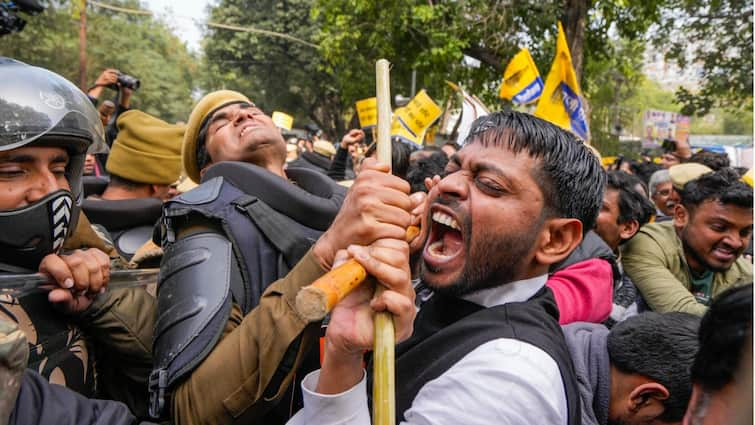The recent Chandigarh mayor poll witnessed a tumultuous turn as water cannons were deployed on protesting youth Congress activists. This incident not only highlights the intensity of the political contest but also raises questions about the use of force in response to peaceful demonstrations.
The backdrop of the Chandigarh mayor poll was already charged with political fervor, with various parties vying for power and influence. As the election day approached, tensions escalated, leading to protests by youth Congress activists who expressed their grievances regarding the electoral process. Their concerns ranged from allegations of malpractice to demands for transparency and accountability in the election procedures.

SOURCE:- NDTV
However, the response from the authorities, in the form of deploying water cannons on the protesting youth Congress activists, has sparked controversy and criticism. Many view this action as a disproportionate use of force against peaceful demonstrators exercising their democratic right to protest. The use of water cannons, typically reserved for controlling unruly crowds or quelling violent protests, raises questions about the authorities’ handling of dissent and their commitment to upholding democratic values.
SOURCE:- INDIA TV
Critics argue that resorting to such heavy-handed tactics undermines the fundamental right to freedom of expression and peaceful assembly guaranteed by the Indian Constitution. Instead of engaging with the protesters’ grievances and addressing their concerns through dialogue and negotiation, the use of force sends a chilling message and further erodes trust in the democratic process.
Moreover, the incident has broader implications for the state of democracy and governance in Chandigarh. It underscores the need for transparent and fair electoral practices that inspire public confidence and participation. The use of force to suppress dissent not only undermines the legitimacy of the electoral outcome but also risks escalating tensions and exacerbating social divisions.
In the aftermath of the water cannon incident, there have been calls for accountability and an independent inquiry into the actions of the authorities. Civil society groups, opposition parties, and human rights organizations have condemned the use of force and called for a thorough investigation to ensure that such incidents are not repeated in the future.
Additionally, there is a growing recognition of the importance of dialogue and constructive engagement in resolving political disputes and grievances. Meaningful dialogue between the government, political parties, and civil society can foster mutual understanding, promote transparency, and strengthen democratic institutions.
the use of water cannons on protesting youth Congress activists during the Chandigarh mayor poll highlights the challenges and complexities of democratic governance. It underscores the importance of upholding fundamental rights, promoting dialogue, and ensuring accountability in the electoral process. Moving forward, there is a need for reflection, reconciliation, and reform to strengthen democratic principles and practices in Chandigarh and beyond.
Share your views in the comments

